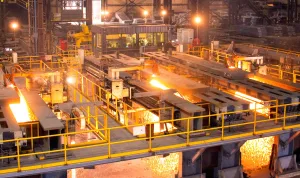How Tariffs Influence Nucor Corporation’s Business: A Deep Dive into Economic Impact

Tariffs, as a tool of trade policy, have a profound impact on businesses operating in the global market. For Nucor Corporation, a major player in the steel industry, tariffs can significantly influence various aspects of its operations and market positioning. This article provides an in-depth analysis of how tariffs affect Nucor Corporation, including the economic implications, strategic responses, and overall impact on business performance.
1. Tariffs and Cost Structures
Impact on Raw Material Costs
Tariffs on imported raw materials, such as scrap metal and iron ore, can increase production costs for Nucor. As a steel manufacturer that relies on these inputs, higher tariffs can lead to increased expenses, which may affect profit margins. Nucor must navigate these cost pressures by optimizing its procurement strategies and exploring alternative sources of raw materials.
Effect on Product Pricing
In response to higher raw material costs due to tariffs, Nucor may adjust its product pricing to maintain profitability. This adjustment involves evaluating market conditions, competitive pricing, and customer demand. The ability to pass on increased costs to customers without losing market share is crucial for Nucor’s financial health.
2. Competitive Positioning
Domestic Market Advantages
Tariffs on imported steel can provide a competitive advantage to domestic producers like Nucor by reducing competition from foreign suppliers. Higher tariffs make imported steel more expensive, potentially increasing demand for Nucor’s products and improving its market share. This advantage can bolster Nucor’s position in the domestic market and enhance its revenue potential.
Global Market Dynamics
While tariffs may benefit Nucor in the domestic market, they can also impact the company’s global market strategy. Tariffs can lead to retaliatory measures by other countries, affecting Nucor’s ability to compete in international markets. The company must carefully manage its global trade relationships and adapt to shifting market conditions influenced by tariffs.
3. Strategic Responses
Operational Adjustments
To mitigate the impact of tariffs, Nucor may implement various operational adjustments. These can include increasing production efficiency, investing in technology upgrades, and optimizing supply chain management. By enhancing operational capabilities, Nucor can better manage cost pressures and maintain its competitive edge.
Diversification and Innovation
Nucor’s strategy to address tariff impacts also involves diversification and innovation. The company may explore new product lines, expand into different markets, or invest in research and development to stay ahead of industry trends. Diversification helps Nucor reduce reliance on specific markets or products, providing greater resilience against tariff-related challenges.
4. Economic and Market Impact
Effect on Industry Dynamics
Tariffs influence broader industry dynamics, including supply chain disruptions and changes in market equilibrium. For Nucor, these shifts can affect overall industry competitiveness and market stability. Understanding these broader impacts helps Nucor anticipate changes in market conditions and adjust its strategies accordingly.
Investor Perceptions and Stock Performance
Tariff-related developments can also affect investor perceptions and Nucor’s stock performance. Investors closely monitor how tariffs impact the company’s financial performance and strategic outlook. Effective communication and strategic management of tariff-related issues are essential for maintaining investor confidence and supporting stock value.
5. Policy and Regulatory Considerations
Compliance and Adaptation
Nucor must navigate the regulatory landscape related to tariffs and trade policies. Compliance with trade regulations and adapting to changes in tariff policies are critical for avoiding legal and operational challenges. Nucor’s ability to effectively manage regulatory requirements contributes to its long-term success.
Advocacy and Engagement
Engaging with policymakers and participating in industry advocacy can also be part of Nucor’s approach to managing tariff impacts. By actively participating in trade policy discussions, Nucor can influence decision-making and advocate for favorable trade conditions that support its business objectives.
Conclusion
Tariffs have a significant influence on Nucor Corporation’s business operations, affecting cost structures, competitive positioning, and strategic responses. Understanding the impact of tariffs on raw material costs, product pricing, and market dynamics is essential for managing their effects. By implementing strategic adjustments, diversifying operations, and engaging with policymakers, Nucor navigates the complexities of tariff-related challenges and maintains its leadership in the steel industry.



